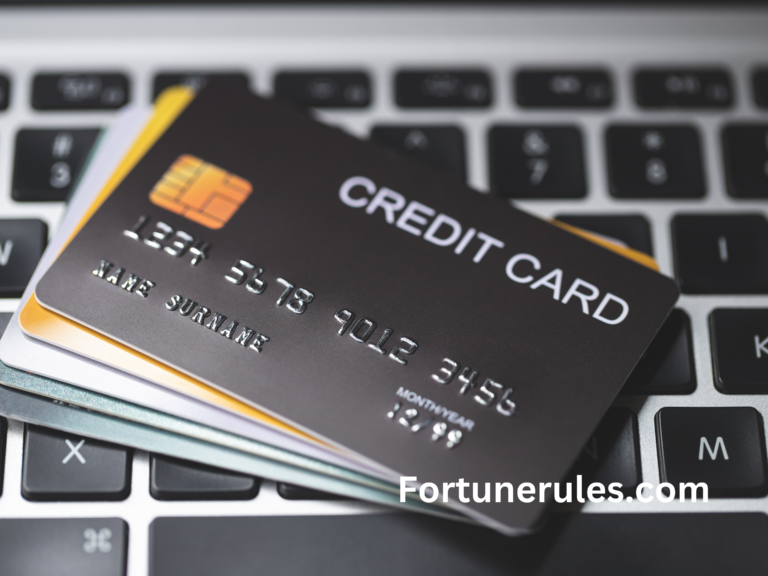Credit cards can be a really helpful financial tool. They offer rewards, convenience, and, in some cases, purchase protection. But many are puzzled by the question: How many credit cards should I have?

There’s no one-size-fits-all solution. Some people do well with one card, while others skillfully manage a handful of them to get the best of all worlds to maximize their rewards and perks. So what is the right number? Discussing the pros and cons of having multiple credit cards, what to consider, and expert tips.
You’ll have a better idea of how many credit cards are appropriate for you considering your financial habits and way of life.
Why Would You Want More Than One Credit Card?
“Why would I even need more than one credit card?” is a question that many individuals have. Having more than one credit card can be advantageous for the following reasons:
A higher credit score
If you have multiple credit cards, it is possible that your credit score will increase. Your debt-to-credit ratio is one element of your credit score. This shows how much of your credit limit you are using.
If you have one card with a $1,000 limit and you’re spending $500 on it, then your utilization rate is 50%. But if you add another card with a $1,000 limit, the total limit is now $2,000. Even if you are still using $500, your utilization rate is now only 25%.
Different Rewards and Benefits
Cashback or rewards on certain cards, discounts at selected retailers, or travel bonuses. Having multiple cards means you can maximize the benefits they offer in terms of where you purchase or what you’re spending.
Backup during Emergencies: A backup card is useful in emergencies, like when one is lost, stolen, or frozen for suspicious activity.
Expense Control: Some people spend on multiple categories with multiple cards. Such as one card for travel, one for business expenses, and one for shopping and dining. This can make it simpler to follow where your money goes.
How Many Credit Cards is Too Many?
How many credit cards you should have is a personal choice. For some, even one or two is too many. Others with five or more works just fine. But how does one find their sweet spot? Let’s break it down:
Your Ability to Manage: having too many credit cards can lead to problems if you tend to forget due dates or miss payments. Late payments can hurt your credit score while costing you money in fees
How Much You Spend: How good are you at sticking to a budget? Multiple credit cards could help as long as you are spending within limits, but if you are predisposed to making impulse buys, it might be best to have fewer cards.
Your Budgetary Goals: If you’re focusing on building credit or attaining specific rewards, having a few cards that support those goals can benefit you. If you’re trying to get out of debt, though, using only one card or none might be better.
The Benefits of Having Multiple Credit Cards
If managed well, having multiple credit cards can provide several advantages. Reasons to Consider Having Multiple Credit Cards
Better Use of Credit: Your credit usage ratio, or the percentage of your credit limit you actually use, has a huge impact on your credit score. You should keep lower usage (ideally under 30%); your overall credit limit increases when you have multiple cards, so it’s easier to maintain low utilization.
NOTE: Say you put $3,000 on one card with a $10,000 credit limit; your utilization is 30%. But if you only spend $3,000 on two cards that have a total limit of $20,000, your utilization is 15%, which can help your credit score.
Using Cash Back & Rewards Wisely: Different types of credit cards earn rewards in different categories. While some of the cards will lend you extra points when traveling, others will offer you large cashback on shopping. Many cards can be used wisely, helping you earn even more.
For example:
-
- A travel rewards card for hotels and flights.
-
- A grocery and gas cashback card.
-
- A card for seasonal purchases with rotating categories.
Using the right card for every purchase means you will maximise how much you get back from your spending.
Emergency Backup Plan: Carrying a second credit card means you’ll never be without credit when you need it most, in the event one of your cards is lost, stolen, or frozen due to fraud.
Longer credit history: The longer the credit history, the higher the value on the score. Opening a new credit card and keeping older ones open helps you maintain a long credit history overall.
The Drawbacks of Having Too Many Credit Cards
While multiple credit cards can be advantageous, there are drawbacks and risks to consider:
More Difficulty Managing Payments: Using multiple cards means tracking multiple due dates, statements, and payment plans. Otherwise, you run the risk of missing payments, which would lead to late fees and potentially impact your credit score.
The Risk of Overspend: Credit availability leads to reckless spending. If you are prone to making impulse purchases, especially having several credit cards can contribute to financial errors.
The Possibility of Annual Fees: Some high-end credit cards come with an annual fee. Sure, they have amazing rewards, but if you’re not using the card frequently enough, it’s not worth the money for the benefits.
What Experts Recommend
Starting with one to three credit cards is what most financial experts recommend. Here’s why:
One Card for Beginners: You should have only one card if you are a beginner in using credit. Teaching you how to use it responsibly is by paying your balance in full each month.
Two Cards Can Get You More: When you get the hang of one card, justify adding a second with different rewards. If your first card offers cash back on groceries, then your second card should give you travel rewards.
Three Cards for Optimization: You may diversify by using three cards. You might have one for travel rewards, one for cash back, and one with a low interest rate in case of an emergency.
How to Pick the Right Credit Cards
Not all credit cards are created equal. When deciding how many credit cards to have, choosing the right ones is also a challenging task.
Interest Rates: If you tend to carry a balance each month, look for a low-interest-rate credit card. Still, remember that the most effective way to avoid interest charges altogether is to pay your bill in full every month.
Rewards: Think about how you spend. If you travel often, a travel points card can be perfect. If most of your spending is on gas and groceries, consider a cash-back card that earns rewards on those purchases.
Charges: Some credit cards come with annual fees. These can be worth it if the rewards and perks justify the cost, but be sure to do the math.
Credit Limit: Having a higher limit may affect your credit utilization ratio, but can trigger temptation to overspend. Choose a credit card that meets your needs and spending habits.
Techniques for Handling Several Credit Cards
If you opt to have more than one credit card, then you will need a plan to manage it efficiently. Here are some pointers:
Set Up Automatic Payments: Establishing automated payments is one way to ensure you never miss a deadline — and to see late fees and interest costs.
Track Your Balance: To ensure you do not overspend, use budgeting software like Mint or YNAB or simply rely on a spreadsheet to track your balances.
Set Calendar Reminders: Set Reminders in Calendar for Payment Deadlines and Conversion to the Reward category So you can make the most of your benefits
Don’t Apply for Too Many Cards at Once: Space out your card applications so that there aren’t any hard inquiries that affect your credit score.
Regularly Review Your Cards: Regularly Check Your Cards If you find that a card’s benefits no longer match your spending habits, it might make sense to downgrade or cancel it (but remember that closing accounts can impact your credit score).
Real-World Examples
Example 1: The Minimalist Approach
John keeps it simple by only using two cards:
-
- A fee-free reward card for everyday spending
-
- A rewards travel card for hotels and flights
-
- This enables him to keep his finances straightforward without making it too complex.
Example 2: A (Rewards) Maximizer
Working with Sarah, an experienced credit card user who strategically uses five cards:
-
- A luxury travel perks credit card
-
- Cash-back bonus on groceries and dining
-
- A rotating-category cash back card
-
- An incentive card for fuel
-
- Long credit history, no-fee card
Common Credit Card Myths
First, let’s dispel some myths about credit cards:
Myth 1: Your credit score goes down if you have more than one credit card.
The reality is that with the right management, having multiple credit cards may boost your credit score.
Myth 2: Closing a card boosts your credit score
The reality is that closing a card can lead to a drop in your credit score — particularly if it reduces your overall available credit.
Myth 3: Having a balance improves your credit.
The real story is that you can save on expensive interest charges and build a terrible credit rating if you pay off your balance every month.
What Are Store Charge Cards?
Store charge cards are types of credit cards that can be used only at a specific retailer or on that particular retailer’s website. So take if you love shopping at a department store, you buy a monthly subscription, and then if you like to shop there, signing up for their branded card may give you special offers or discounts. This can be really helpful for major buying occasions, like the holidays or back-to-school season.
How It Works
Restrictions: A store charge card can only be used at the issuing retailer, in contrast to general-purpose credit cards.
Repayment Terms: Many store cards are set up like charge cards, in that you must pay the statement balance in full at the end of every billing cycle. Some function as revolving credit, but they typically carry a higher interest rate.
Intro Offers: They often come loaded with attractive benefits, such as discounts or 0% intro interest, or deferred interest offers (meaning that you’re only charged interest if you don’t pay off the balance in full before the promotional period runs out).
Pros of Store Charge Cards:
Rewards & Discounts: When you open a card, many retailers give you an instant discount on your first purchase.
Easier Approval: Getting approved for these cards is often easier for those with lower credit scores.
Cons of Store Charge Cards:
High Interest Rates: Interest can mount up quickly if you don’t pay off the bill immediately.
Restricted Use: You can only use them at the specific store.
Tip: To maximize your savings and prevent interest fees, pay up your shop card as soon as possible.
What Happens If Your Credit Card Gets Compromised?
Some credit card companies will freeze or even cancel a credit card if they suspect fraud. This can happen if someone tries to use your card number to make strange purchases.
The best-case scenario is that you have to call the company to ensure your card wasn’t stolen.
The worst-case scenario is that they might issue you a new card, which can take a few days to reach you.
How to Be Prepared:
-
- Carry at least two cards with you at all times. Keep a third card in a secure location at home.
-
- Always keep cash or a debit card on hand as a backup payment option.
Frequently Asked Questions (FAQ’s)
1. How Do You Use One Credit Card to Build Credit?
You can build a healthy credit history with one credit card, but having two or three can diversify your credit mix and have a lower overall utilization.
2. Does having too many credit cards hurt my credit score?
Not specifically, but if juggling multiple cards causes missed payments or high balances, it will affect your score.
3. How many credit cards do I need for the best rewards?
It depends on your spending habits; a lot of experts recommend two to three cards to maximize rewards across various outlays without being overwhelming.
4. What is the frequency of applying for a new credit card?
Consider applying only when you have a genuine need for one, and space out applications (usually around six months apart) to limit how much hard inquiries can affect your credit score.
5. Is it wise to close credit card accounts I don’t use anymore?
Not necessarily, having older cards open (if they don’t have an annual fee) contributes to a longer credit history and an overall higher available credit, which are good for your score.
6. Will opening a new credit card increase available credit?
Yes, assuming you use it responsibly, a new card can reduce your credit utilization ratio, which is one of the biggest components of your credit score.







